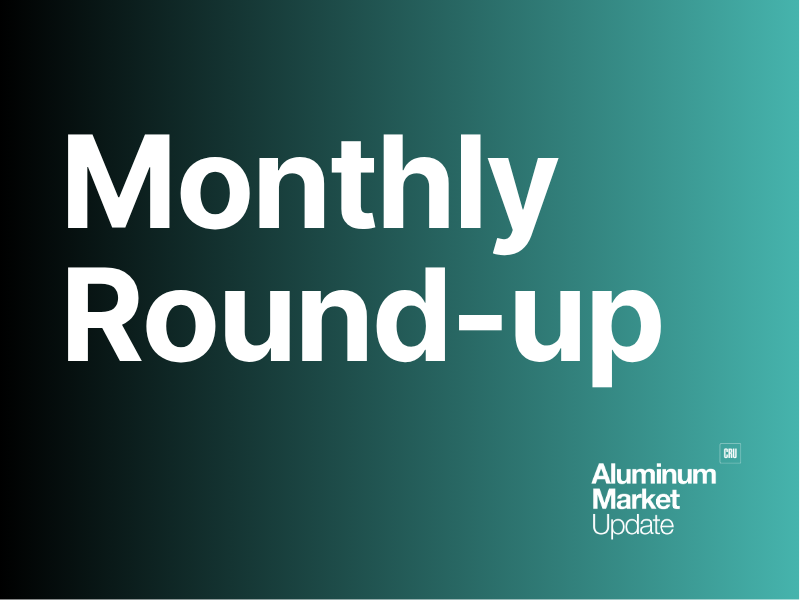Monthly Round-up

July 31, 2025
AMU's July monthly round-up: A lawsuit, new capacity, and tariffs, of course
Written by Stephanie Ritenbaugh
There’s a lot of news to keep track of, so we’re lending a hand with highlights from the past month and what they mean for you.
Company news
July marked the end of the second quarter of the fiscal year, a quarter defined by tariffs on aluminum, imported vehicles and auto parts, and ushered in a fresh round of earnings releases.
- Companies like Ford, General Motors, Toyota, and Honda all posted solid year-over-year Q2’25 sales gains. But much of that could be due to huge inventory build-ups in March to get ahead of import taxes. AMU’s Nicholas Bell digs into the numbers and what they mean for downstream aluminum suppliers.
- For Pittsburgh-based Alcoa, the second quarter showcased a drastically changed tariff landscape. Despite an annual 5% increase in primary aluminum production to 572 million tons, shipments dropped by 6% to 634 million tons over the same period. The divergence may be due to reallocating metal staged for non-traditional customers, or it could simply be a demand story.
- Rio Tinto reported a second quarterly bauxite production record. The world’s second-largest miner by market value said it now expects the aluminum raw material to hit the upper end of its full-year guidance range. But tariffs still sting. The company was hit with about $300 million in gross costs from U.S. tariffs on its Canadian primary aluminum exports during the first half of the year.
“A substantial part thereof has been compensated by the related increase in the US Midwest duty-paid premium, which rapidly adapted to the 25% tariffs level in Q1, but, at the end of Q2, was not fully compensating for the 50% tariff,” the company stated.
- North America’s largest aluminum smelter, Aluminerie Alouette, extended a long-term power supply agreement with hydroelectric power producer Hydro-Québec through 2045. Alouette also committed $1.1 billion in facility upgrades and secured the smelter’s power supply for the next two decades, ahead of the current contract’s 2029 expiration date. The power deal plays into the growing importance of long-term energy pricing strategies and emissions targets.
- A key Biden-era manufacturing tax credit will be phased out the budget reconciliation bill passed by Congress in July. Section 45X of the Internal Revenue Code implemented the advanced manufacturing production credit, which aimed to incentivize the production of “eligible components” within the United States. “Eligible components” include certain solar energy components, wind energy components, inverters, qualifying battery components, and applicable critical minerals. Now, that provision, which the Aluminum Association said was “vital” to promoting manufacturing investments in primary aluminum production, is set to sunset by 2030.
- Aluminum Dynamics Inc. shipped its first aluminum flat-rolled coils from its Mississippi mill in June, as parent company Steel Dynamics Inc. (SDI) seeks to diversify its steel-centric portfolio. The company expects to end the year with a utilization rate at its Columbus, Miss., plant between 40% and 50%, and exit 2026 at 75%. And the company said rising domestic demand has bolstered the business case for the investment.
“The supply deficit is definitely there. That will continue to grow. And it’s being supplied, obviously, by imports with a huge tariff attached to it,” SDI’s chief exec said. “So us bringing volume on in that environment is very, very positive for us and for the customer base as well.”
Trade and tariffs
It’s no secret that the U.S. aluminum market relies on imports. So, how is the domestic market handling Section 232 tariffs, which spiked to 50% in June? AMU takes a look at the major trading partners.
- Ball Corporation has selected the city of Millersburg, Oregon, for its next beverage can manufacturing facility, part of an ongoing effort to expand its North American production footprint. But this is more than just a site selection story. Domestic demand for aluminum cans remains strong, but new builds and legacy assets have largely been clustered in the South, the Midwest, and the eastern seaboard. Why is that? The West presents peculiar trade-offs.
- Alcoa said it has been forced to pause its growth projects in Canada due to President Trump’s tariffs. Chief Executive Officer Bill Oplinger told Bloomberg News the company is “looking very hard at capital investments” in Quebec. Alcoa owns two smelting and casting facilities in Quebec, along with a third operated through a joint venture in which it holds a 75% stake, and relies on its Canadian operations to meet U.S. demand. It already has been redirecting shipments typically destined for the U.S. market to avoid tariffs.
- Norwegian aluminum producer Norsk Hydro said tariffs haven’t hit its operations hard yet. But it is cutting its capital expenditure guidance and freezing hiring white-collar workers due to “global market uncertainty.”
“We have, so far, not seen big changes to our operations from tariffs and potential trade wars. Our main concern is whether the uncertainty will lead to a global economic downturn.”
Building and construction
Tariffs and inflation have been wreaked havoc on prices, and higher interest rates and lending requirements have made financing more difficult. Meanwhile, immigration crackdowns have led to worksites being raided and employees afraid of reporting in, regardless of status.
- The construction sector is sending some mixed signals. Some indicators, like the Dodge Momentum Index, showed surprise growth in June. Others, like spending, are flagging.
- And here’s a deeper dive into what’s happening in office and industrial sectors. It’s… fragmented.
- Rolls-Royce Holdings plc plans to invest $75 million to expand its Aiken, South Carolina engine plant as demand for data centers drives the need for generator sets. Earlier this year, Rolls-Royce announced a $24 million expansion of its Mankato, Minnesota facility, adding 100 jobs to its U.S. Power Systems division. While data center construction could drive some aluminum demand, it also intensifies the competition for electricity. That creates a big challenge for restarting or building out primary aluminum capacity. In fact, electricity was a contributing cause to the loss of over 30 smelters over the last four decades, as AMU reported in May.
Logistics
OEMs are struggling to maintain pricing power, trailer body builders are absorbing disproportionate inflation, and fleets are waiting out uncertainty by extending equipment lifecycles or shifting to rentals.
- A brief surge in June trailer orders offered a flicker of optimism, but the commercial vehicle market remains stuck between softening freight activity and rising input costs, particularly for aluminum-intensive products. Tariffs and fabrication costs are inflating nominal pricing, but true demand signals remain inconsistent and fragile for aluminum suppliers in this fractured landscape.
Packaging
Scrutiny in the packaging sector intensified this month, with a government investigation into potential tariff evasion by overseas supplier and the final stages of a decade-plus legal battle between two canmaking heavyweights.
- Two giants of the packaging world, Ball Corp. and Crown Holdings, have been duking it out in court over beverage can design for more than a decade. Crown had alleged that Ball infringed on Crown’s patents that lessen the weight of aluminum used in can production. But the case itself “serves as an ongoing example of the beverage can industry’s intense competitive secrecy in lightweighting and innovating the perfect can.” It’s an interesting case that deals with design, innovation, recycling rates and scrap.
- The U.S. Department of Commerce launched a tariff evasion inquiry into aluminum foil containers, pans, trays and lids that incorporate foil originating from China. At the heart of the inquiry is the accusation that Chinese producers facing high duties are redirecting production through affiliates in Vietnam and Thailand to maintain access to the U.S. market.
Recycled metals
On July 15, American Axle & Manufacturing (AAM) shareholders voted to advance its acquisition of UK-based Dowlais Group PLC, parent company of driveline heavyweight GKN Automotive and powder metallurgy specialist GKN Powder Metallurgy.
- Don’t miss this two-part story on the merger between two key companies in North American auto parts supply chain. The deal between AAM and Dowlais signals an inflection point for aluminum usage in vehicles, regional scrap flows, global supply chain exposure, and the evolving economics of internal combustion engine vehicles and electric vehicles. The tie-up also sets up the new company to become a juggernaut of scrap generation in North America.
Survey
AMU’s July survey shows aluminum market participants are increasingly concerned about demand. And yet most – nearly 80% – expect the Midwest Premium to hold steady or increase on the impact of President Trump’s tariffs.
Those outlooks hinged largely on what respondents think will happen on the tariff front.
Here is what some of them had to say:
“Depends on whether Trump reduces (tariffs) or if Canada gets a tariff agreement.”
“The ‘Trump Factor’ is the unknown.”
“All depends on the tariffs. I think there will be compromises.”
If you haven’t participated yet, we want to invite you to tell us about business conditions in the aluminum industry on Aug. 25 when the next survey is released. How is demand? How are supply chains holding up? And how are prices trending? Our monthly survey collects data on these and other topics in an anonymous format. The goal is to provide you with a snapshot of the market as it is, from the folks in the trenches. You can reach out to nicholas.bell@crugroup.com to find out more.



